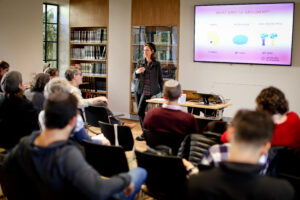As Anniversary of October 7th Approaches, For the Sake of Argument Continues to bring Jewish Communities Together for Healthy Disagreements
September 3rd, 2024
New study shows that becoming smarter about arguments helps people become closer to those with whom they argue.
When educators Robbie Gringras and Abi Dauber Sterne launched For the Sake of Argument in 2022, they wanted to help people in Jewish communities engage in healthy arguments, particularly those centered around Israel. They do this work through stories designed to provoke disagreements about issues central to the State of Israel and the Jewish world, and a new “pedagogy of argument” to help people gain the confidence and know-how to have healthy arguments. What undoubtedly seemed important in 2022 took on an unprecedented level of urgency after October 7th, 2023 as communities grappled with newfound tensions and sensitivities. A new study shows the impact and continued potential of For the Sake of Argument’s efforts.
 “More and more communities are reaching out looking for support and guidance,” said Dauber Sterne. “Conversations around Israel right now can either tear communities apart or strengthen connections and build mutual understanding. Educational leaders know they must engage in these conversations, and they want to—but doing it constructively and in a healthy manner takes an intentional approach and training.”
“More and more communities are reaching out looking for support and guidance,” said Dauber Sterne. “Conversations around Israel right now can either tear communities apart or strengthen connections and build mutual understanding. Educational leaders know they must engage in these conversations, and they want to—but doing it constructively and in a healthy manner takes an intentional approach and training.”
On the eve of their publication of a new collection of argument-stories about issues arising from October 7th, key findings from the new study conducted by Rosov Consulting about For the Sake of Argument show its influence on participants and communities:
FSA participants share how the program influenced them:
The information they gave us about when you’re in a conversation with someone, to try to make sure that you’re listening to them, and that you’re using certain key phrases—I found that really actually worked. I have problems with talking over people. And so, it did actually help to recognize, okay, if I’ve been talking for a long time, you might want to end off with, ‘But I want to hear what you have to say’.… Now I get to actually hear other opinions. – Toronto teen
The main thing I took away was it doesn’t hurt to listen without interrupting. You can get your turn in, but you can wait. … I use what I’ve learned in the sessions mainly regarding listening. … In the past I would probably have just gone for the jugular, and now I might just nod and go, ‘Aha, maybe we should talk about that sometime.’ – Limmud, older adult
About the study:
The study was conducted over the course of two blocks of time as part of collaborations with Limmud UK and UJA Federation of Greater Toronto. At Limmud, participants took part either in a 45-minute, one-off session or a series of four 45-minute sessions over the course of four days. In Toronto, they participated in either a one-time 90-minute session or two 90-minute sessions. 190 participants completed a survey at the start of their first FSA sessions and also at the end of their last one; 15 session participants were also interviewed about three months after their sessions.
The Jim Joseph Foundation is a supporter of For the Sake of Argument. Access FSA’s full resources here and the newest evaluation from Rosov Consulting here.